|
|
|
Sort Order |
|
|
|
Items / Page
|
|
|
|
|
|
|
| Srl | Item |
| 1 |
ID:
180358
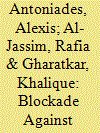

|
|
|
|
|
| Summary/Abstract |
On 5 June 2017, the United Arab Emirates, Bahrain, Saudi Arabia, and Egypt cut diplomatic ties with the State of Qatar and initiated a blockade against the country. In this study, we provide the first in-depth examination of the impact the blockade had on Qatar’s economy and review the policy responses that followed. In particular, we consider how the policies that have since emerged either complemented or deviated from past policies and practices and evaluate whether they have in fact brought long-term benefits to the country –– benefits that may have not been realized had the blockade not taken place. Our review finds that the blockade did not cause a shift in policy direction, but it did change the urgency and process by which policies were put together and pushed forward, as well as their effectiveness. Furthermore, we find that the timing of the blockade worked in Qatar’s favor in surprising ways. To the best of our knowledge, this is the first study to provide both a meticulous documentation of the policy responses that followed the blockade and an in-depth analysis of its impact.
|
|
|
|
|
|
|
|
|
|
|
|
|
|
|
|
| 2 |
ID:
176538
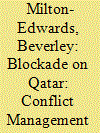

|
|
|
|
|
| Summary/Abstract |
Current tensions in the Gulf region highlight the persistence of crises and conflict. A number of states within the area now regularly engage in interventionist actions that challenge previously held norms of sovereignty and non-intervention. Fragmentation characterises what were once considered fairly robust structures of unity and enduring regional organisation. Theoretical norms that presuppose non-intervention are tested by new forms of coercion and interventionism among Gulf actors that exacerbate rather than resolve security dilemmas. In turn, this highlights the inadequacies of normative models of conflict management and resolution, and in particular mediation. These developments are examined in the case of the blockade against Qatar instituted by Bahrain, Egypt, Saudi Arabia and the United Arab Emirates in June 2017.
|
|
|
|
|
|
|
|
|
|
|
|
|
|
|
|
| 3 |
ID:
109779
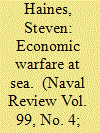

|
|
|
| 4 |
ID:
117429
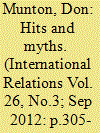

|
|
|
|
|
| Publication |
2012.
|
| Summary/Abstract |
Graham Allison's Essence of Decision: Explaining the Cuban Missile Crisis is recognized more for its general decision-making models than for its historical analysis. The second (1999) edition, co-authored with Philip Zelikow, adopts the same basic models and answers the same three 'central puzzles' of the missile crisis: (1) why did the USSR deploy nuclear missiles to Cuba; (2) why did the United States blockade Cuba; and (3) why did the USSR withdraw its missiles? This review article questions the answers Allison and Zelikow provide to each of these questions. In particular, I discuss the importance of the partially secret Khrushchev-Kennedy agreement as a factor in ending the crisis and present new evidence suggesting that Turkey may not, as usually assumed, have been opposed at the time of the crisis to decommissioning its US Jupiter missiles. I also suggest some additional missile crisis questions beyond the three 'central puzzles'.
|
|
|
|
|
|
|
|
|
|
|
|
|
|
|
|
| 5 |
ID:
183251


|
|
|
|
|
| Summary/Abstract |
Kuwait has developed and earned a reputation as a mediator in regional affairs as leadership-level conceptions of ‘national’ and ‘regime’ security have intersected with pragmatic assessments of the benefits any such mediation would bring to Kuwait’s regional interests. As a small state in a volatile neighbourhood, such calculations have been accorded greater policymaking priority than any ideational attachment to mediation. Kuwait’s experience is nevertheless worthy of closer study for the lessons that can be drawn for other small states, especially those in the Gulf, which share broadly similar attributes to Kuwait in style of decision-making and the careful balancing of competing regional pressures.
|
|
|
|
|
|
|
|
|
|
|
|
|
|
|
|
| 6 |
ID:
067751
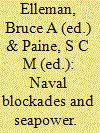

|
|
|
|
|
| Publication |
London, Routledge, 2006.
|
| Description |
xxi, 319p.
|
| Series |
CASS Series-Naval policy and history; 34
|
| Standard Number |
0415354668
|
|
|
|
|
|
|
|
|
|
|
|
Copies: C:1/I:0,R:0,Q:0
Circulation
| Accession# | Call# | Current Location | Status | Policy | Location |
| 051020 | 359.44/ELL 051020 | Main | On Shelf | General | |
|
|
|
|
| 7 |
ID:
122930
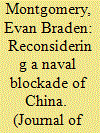

|
|
|
|
|
| Publication |
2013.
|
| Summary/Abstract |
Sean Mirski's assessment of a naval blockade is an important contribution to the debate over how the United States should respond to China's growing military power. Nevertheless, it has three limitations. First, although distant and close-in blockades could be employed in tandem, analyzing them separately helps to explain when they might be used and how they could influence escalation. Second, while conventional countervalue and counterforce options could also be employed together, this would depend on the degree to which they overlapped and the order in which they were implemented. Third, a blockade could lead to unanticipated prewar, intra-war, and postwar challenges.
|
|
|
|
|
|
|
|
|
|
|
|
|
|
|
|
| 8 |
ID:
151428


|
|
|
|
|
| Summary/Abstract |
The concept of the command of the sea has its roots in medieval notions of the sovereignty of coastal waters, as claimed by several monarchs and polities of Europe. In the sixteenth century, a surge of intellectual creativity, especially in Elizabethan England, fused this notion with the Thucydidean term ‘thalassocracy’ – the rule of the sea. In the light of the explorations of the oceans, this led to a new conceptualisation of naval warfare, developed in theory and then put into practice. This falsifies the mistaken but widespread assumption that there was no significant writing on naval strategy before the nineteenth century.
|
|
|
|
|
|
|
|
|
|
|
|
|
|
|
|
| 9 |
ID:
144526
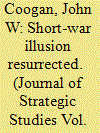

|
|
|
|
|
| Summary/Abstract |
Nicholas Lambert argues that in 1912 Britain believed it had developed an economic warfare strategy that promised a quick and bloodless victory in the event of war against Germany. This article scrutinises this argument and demonstrates that its evidential and methodological flaws render it untenable.
|
|
|
|
|
|
|
|
|
|
|
|
|
|
|
|
| 10 |
ID:
152028
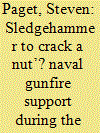

|
|
|
|
|
| Summary/Abstract |
The utility of naval gunfire support (NGS) during the Malayan Emergency has been the subject of significant scrutiny. While the limitations of NGS were demonstrated in Malaya, it also has proven to be extremely useful under certain circumstances. The circumstances in which NGS has proven effective during earlier and later insurgencies have generally reflected those of the Malayan Emergency. Recent operations in Afghanistan and Iraq have been less conducive to the application of maritime power, but they did not denote the end of the naval role or the potential usefulness of NGS in counterinsurgency operations. NGS is an unheralded capability, but, aside from the historical significance, it remains relevant in the contemporary era under the right conditions.
|
|
|
|
|
|
|
|
|
|
|
|
|
|
|
|
|
|
|
|
|